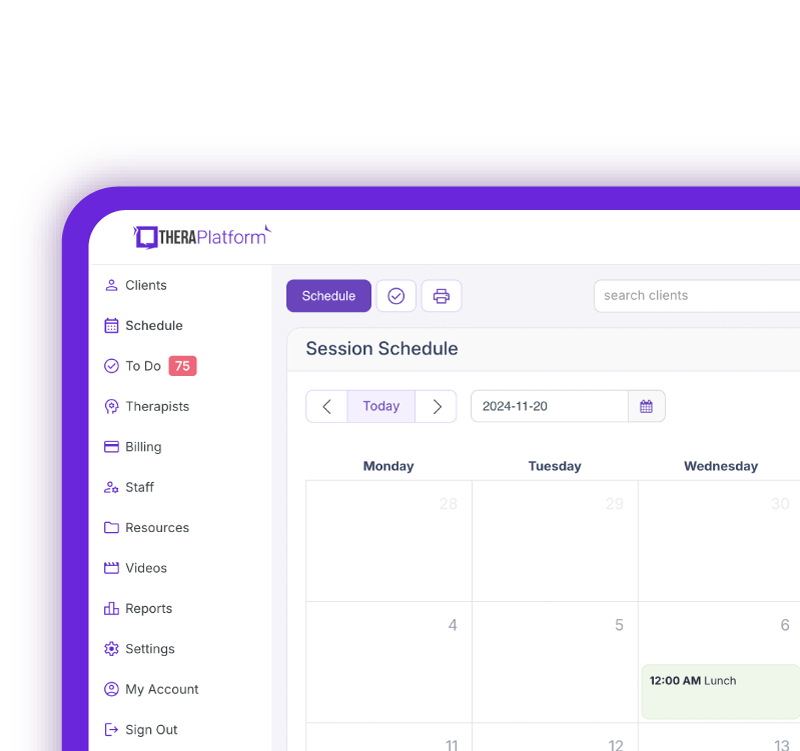Dysphagia ICD-10

Dysphagia ICD 10 is the code used by Speech-Language Pathologists working with adults diagnosed with Dysphagia. The American Speech-Language-Hearing Association (ASHA), describes Dysphagia as a ”swallowing disorder involving the oral cavity, pharynx, esophagus, or gastroesophageal junction.”
Summary
- ICD-10 code R13.1 is used to diagnose dysphagia, with subcodes (e.g., R13.10–R13.14, R13.19) specifying the phase or type of swallowing difficulty. Accurate coding is essential for insurance reimbursement and compliance with HIPAA and payer guidelines. Enrolling in an insurance billing course for therapists can help providers enhance their knowledge.
- Dysphagia affects about 1 in 25 adults annually, often stemming from neurological conditions, trauma, or head/neck disorders. SLPs play a central role in assessment and treatment, including oral-motor exams, diet modifications, and compensatory techniques.
- SLPs must distinguish dysphagia from related disorders, such as pediatric feeding disorders or post-stroke sequelae, to avoid coding errors. Codes like I69.391 or R13.19 may be more appropriate depending on cause and comorbidities.
- By leveraging an EHR like TheraPlatform for efficient documentation and claim submission, therapists can tackle billing with ease.
→ Click here to enroll in our free on-demand Insurance Billing for Therapists video course [Enroll Now]
Dysphagia not only affects a client’s quality of life but can lead to serious health consequences. Swallowing disorders can result in medical conditions such as aspiration pneumonia, choking, malnutrition, dehydration, and overall compromised general health.
Speech-Language Pathologists (SLPs) play a critical role as part of an interdisciplinary team of medical professionals treating a client with Dysphagia. SLPs are responsible for identifying signs and symptoms of Dysphagia through assessments. The SLP also provides treatment for Dysphagia that can include certain exercises to improve the strength and coordination of oral-pharyngeal musculature for swallowing.
Streamline your insurance billing with One EHR
- Claim batching
- Auto claims
- Automated EOB & ERA
- Real-time claim validation
- Real-time claim tracking
- Aging and other reports

SLPs working with clients who have Dysphagia also provide recommendations for how to modify the client’s diet, including adjusting the consistency of food and thickening of liquids.
Dysphagia occurs commonly in the U.S. population, with about 1 in 25 adults experiencing a swallowing problem each year. SLPs need to understand the nature of the speech disorder and how to properly diagnose it.
Being knowledgeable about Dysphagia can also help Speech-Language Pathologists ensure they are following Medicaid and ASHA guidelines to document a Dysphagia ICD-10 code for certain clients to the highest degree of specificity.
Here’s what you need to know about the Dysphagia ICD 10 code criteria symptoms of Dysphagia, and the top-recommended resources to guide your treatment.
Watch this video to learn common insurance billing struggles and solutions
→ Start My Free Trial
→ Start My Free Trial
Dysphagia ICD 10
SLPs are required to use ICD-10 codes when diagnosing clients and charging procedures. To stay compliant with HIPAA regulations and for payment by Medicare, Medicaid, and private insurance companies, therapists must use the most accurate, specific ICD-10 codes.
R13.1 is the Dysphagia ICD 10 code to use when diagnosing a client with this condition.
Therapists can use the Centers for Disease Control and Prevention’s (CDC) ICD-10 lookup tool to view some of the specifications surrounding when to use the Dysphagia ICD 10 code for a client who has swallowing difficulty.
According to the 2022 list of ICD-10 CM Diagnosis Codes related to Speech, Language, and Swallowing Disorders by the American Speech Language Hearing Association (ASHA), R13.1 should be used as the Dysphagia ICD 10 code for this diagnosis. This excludes Dysphagia following cerebrovascular disease (I69. with final characters -91 should be used in that case).
The code for Dysarthria falls under the area of “Symptoms and signs involving the digestive system and abdomen” (R10-R19).
Here are some of the specific codes that fall under the R13.1 Dysphagia code:
Code | Condition |
|---|---|
R13.10 Dysphagia | Unspecified; Difficulty in swallowing NOS |
R13.11 Dysphagia | Oral phrase |
R13.12 Dysphagia | Oropharyngeal phase |
R13.13 Dysphagia | Pharyngeal phase |
R13.14 Dysphagia | Pharyngoesophageal phase |
R13.19 Other Dysphagia | Cervical Dysphagia, Neurogenic Dysphagia |
When giving the R13.1 diagnosis for Dysphagia ICD 10, SLPs should be knowledgeable about the signs and symptoms of this speech disorder.
Practice Management + EHR + Telehealth
Mange more in less time in your practice with TheraPlatform

What are the symptoms of Dysphagia?
The Mayo Clinic reports, “Dysphagia is difficulty swallowing - taking more time and effort to move food or liquid from your mouth to your stomach. Dysphagia can be painful. In some cases, swallowing is impossible.”
Common Causes of Dysphagia include:
- Damage to the central nervous system or brain, such as stroke, TBI, Parkinson’s disease, dementia and developmental disabilities
- Disorders that affect the head/neck, such as cancer (esophageal, oral), surgery, trauma, history of intubation or tracheostomy or poor dentition.
- Other factors include pulmonary diseases and side effects from certain medications.
Some of the signs and symptoms that are associated with Dysphagia include the following:
- Coughing
- Choking, inability to swallow
- Weight loss
- Presence of drooling
- Hoarse vocal quality
- Difficulty managing saliva/drooling
- Painful swallowing
An individual does not have to present all of the above symptoms to have a diagnosis of Dysphagia. Clients with Dysphagia may demonstrate any number of these signs. The severity of a client’s Dysphagia can range from mild to severe.
An individual may be diagnosed with Dysphagia at any age, however the disorder is more commonly seen in adults than in children.
In the pediatric population, Dysphagia may be seen in children who have diagnoses such as Cerebral Palsy, genetic disorders, and those who have experienced a traumatic brain injury (TBI) or a brain tumor.
SLPs working with adults may see signs of Dysphagia in those individuals who have had a stroke, TBI, or a progressive neurological disease such as Parkinson’s Disease, Amyotrophic Lateral Sclerosis (ALS), and Muscular Dystrophy.
Dysarthria can co-occur with speech and language disorders. For example, a child may have both a mixed receptive-expressive language disorder and Dysphagia. An adult who has had a Cerebrovascular Incident may have Aphasia as well as Dysphagia.
SLPs such be sure to review the CDC’s changes for 2022 regarding swallowing disorders, including new ICD-10 codes for Pediatric Feeding Difficulties, which are differentiated from the Dysphagia ICD 10 code. SLPs can learn more through ASHA’s description of the changes.
Practice Management + EHR + Telehealth
Mange more in less time in your practice with TheraPlatform

Prevalence of Dysphagia
According to ASHA, Dysphagia may occur in 22% of adults over 50 years old.
There are several estimates of the prevalence of Dysphagia as it is associated with common neurological diagnoses:
- 29% - 64% of stroke patients
- Up to 90% of individuals with Parkinson’s disease or ALS
- 13% to 57% of those with Dementia
When Not to Use R13.1 for the Dysphagia ICD 10 Code
SLPs are advised to use R13.1 as the Dysphagia ICD 10 code for children who have a Pediatric Feeding Disorder (PFD).
Therapists should follow the sequelae of Dysphagia to include the most specific, accurate code, such as for Dysphagia:
- Following cerebral infarction (I69.391)
- Following subarachnoid hemorrhage (169.091)
- Following specified disease NEC (169.891)
- Neurogenic (R13.19)
And several others.
SLPs should refer to the Center for Disease Control’s (CDC’s) ICD-10 lookup tool each year to ensure they are using the most accurate, up to date ICD Code.
The Dysphagia ICD 10 code can be used for a client in conjunction with codes that indicate language disorders, such as F80.1 Expressive Language Delay or F80.2 Mixed Receptive Expressive Language Disorder.
Assessment and treatment for individuals with Dysphagia
An assessment for a client who is suspected of having Dysphagia may include:
- Oral motor examination
- Case history (obtaining information through interviewing the client and/or family, asking about symptoms, reviewing medical chart/history, and interdisciplinary collaboration with other professionals managing the client’s treatment).
- Non-instrumental assessment: May include assessment of secretion management, viewing and analyzing swallowing pattern, assessment of vocal quality.
- Instrumental assessment (such as a video swallow study).
When providing treatment for a client with Dysphagia, the SLP may include:
- Modifications to diet consistency
- Compensatory strategies/modifications that the client is taught
- Electrical Stimulation (E-Stim)
SLPs can utilize the following resources for providing treatment:
- ASHA: Adult Dysphagia
- Medbridge: Courses for SLPs on Dysphagia
- American Board of Swallowing and Swallowing Disorders
- TheraPlatform Resource Center
How EHR and practice management software can save you time with insurance billing for therapists
EHR with integrated billing software and a clearing house, such as TheraPlatform, offers significant advantages in creating an efficient insurance billing process. The key is minimizing the amount of time dedicated to developing, sending, and tracking medical claims through features such as automation and batching.
What are automation and batching?
- Automation refers to setting up software to perform tasks with limited human interaction.
- Batching or performing administrative tasks in blocks of time at once allows you to perform a task from a single entry point with less clicking.
Which billing and medical claim tasks can be automated and batched through billing software?
- Invoices: Create multiple invoices for multiple clients with a click or two of a button or set up auto-invoice creation, and the software will automatically create invoices for you at the preferred time. You can even have the system automatically send invoices to your clients.
- Credit card processing: Charge multiple clients with a click of a button or set up auto credit card billing, and the billing software will automatically charge the card (easier than swiping!)
- Email payment reminders: Never manually send another reminder email for payment again, or skip this altogether by enabling auto credit card charges.
- Automated claim creation and submission: Batch multiple claims with one button click or turn auto claim creation and submission on.
- Live claim validation: The system reviews each claim to catch any human errors before submission, saving you time and reducing rejected claims.
- Automated payment posting: Streamline posting procedures for paid medical claims with ERA. When insurance offers ERA, all their payments will post automatically on TheraPlatform's EHR.
- Tracking: Track payment and profits, including aging invoices, overdue invoices, transactions, billed services, service providers.
Utilizing billing software integrated with an EHR and practice management software can make storing and sharing billing and insurance easy and save providers time when it comes to insurance billing for therapists.
Streamline your practice with One EHR
- Scheduling
- Flexible notes
- Template library
- Billing & payments
- Insurance claims
- Client portal
- Telehealth
- E-fax

Resources
TheraPlatform is an all-in-one EHR, practice management, and teletherapy software built for therapists to help them save time on admin tasks. It offers a 30-day risk-free trial with no credit card required and supports different industries and sizes of practices, including speech-language pathologists in group and solo practices.
More resources
- Therapy resources and worksheets
- Therapy private practice courses
- Ultimate teletherapy ebook
- The Ultimate Insurance Billing Guide for Therapists
- The Ultimate Guide to Starting a Private Therapy Practice
- Insurance billing 101
- Practice management tools



